19 Aug 2019 | Campaigns -- Featured, Statements
[vc_row][vc_column][vc_column_text]We are deeply troubled by the appointment of Lord Carlile as Independent Reviewer of Prevent. Not only has the government failed to follow its own Governance Code on Public Appointments, but Lord Carlile’s close ties with and publicly declared support for the Prevent strategy undermine the integrity and credibility of this review from the outset.
In January 2019, following Parliament’s insistence on an independent review of Prevent, the government announced that such a review would occur. Proponents of the review have consistently called for it to be meaningfully independent and conducted by someone with no current or prior experience as a government-appointed reviewer.
In June, the government assured Parliament that the appointments process would follow the Cabinet Office Governance Code on Public Appointments.(1) Yet the government has failed to follow that Code, including by failing to publicly advertise the position and publish information about the selection criteria.
Lord Carlile cannot be considered impartial or independent. He has been a member of the Home Office’s Prevent Oversight Board (2) charged with “driving delivery” (3) of Prevent, and has declared his “considered and strong support” for the Prevent strategy.(4) In May this year, he told a public audience that “the appointment of a Prevent reviewer [is] completely unnecessary, based on fictitious or complete lack of evidence”.(5) Indeed, it seems that Lord Carlile himself doubts his ability to be impartial about Prevent, telling the House of Lords in 2018: “I admit I played a part in [Prevent], so I may be somewhat biased towards it […] and I accept the accusation of apparent bias as a possibility. However, I believe that Prevent has demonstrated that it has been successful”.(6)
There seems to be little purpose in an “independent review” whose outcome is pre-ordained by Lord Carlile’s self-declared partiality. His appointment to this vitally important position shatters the credibility of the review from the outset. The review should be comprehensive and wide-ranging in scope and not one that starts with the premise that Prevent should be continued and/or expanded.
We call upon the government to urgently rethink this appointment and ensure that the review is led by a genuinely independent person who inspires confidence in affected communities, with a willingness to go where the evidence may lead.
Liberty
Index on Censorship
Defend Digital Me
Medact
CAGE
Maslaha
MEND
The Runnymede Trust
JUST Yorkshire
Open Society Justice Initiative
- Response to Lord Anderson of Ipswich (HL16344), 27 June 2019, available at https://www.parliament.uk/business/publications/written-questions-answers-statements/written- question/Lords/2019-06-13/HL16344/.
- House of Lords, 17 December 2018, Hansard column 1637, https://hansard.parliament.uk/lords/2018-12- 17/debates/A45EE86B-0D09-472D-BF99-D64DDF9D5D20/Counter-TerrorismAndBorderSecurityBill (“I happen to be a member of the Prevent oversight board”); Joint Committee on Human Rights, Oral evidence: Legislative Scrutiny: Counter-extremism Bill, HC 647 9 March 2016, available at http://data.parliament.uk/writtenevidence/committeeevidence.svc/evidencedocument/human-rights- committee/countering-extremism/oral/30366.html.
- Response to Lord Carlisle of Berriew (HL 4388), 18 January 2017, available at https://www.parliament.uk/business/publications/written-questions-answers-statements/written- question/Lords/2017-01-09/HL4388/.
- Prevent Strategy, HMSO June 2011, CM8092, page 4.
- Remarks at the Open Government Partnership Global Summit, Ottawa, 31May 2019, plenary session. Available on YouTube https://www.youtube.com/watch?v=Xp9epxiKVy0 at 2hrs 51mins 45secs.
- House of Lords, 17 December 2018, Hansard column 1625, available at https://hansard.parliament.uk/lords/2018-12-17/debates/A45EE86B-0D09-472D-BF99-D64DDF9D5D20/Counter- TerrorismAndBorderSecurityBill
[/vc_column_text][/vc_column][/vc_row][vc_row][vc_column][vc_basic_grid post_type=”post” max_items=”4″ element_width=”6″ grid_id=”vc_gid:1566208746266-c88aa023-c11f-10″ taxonomies=”6867, 6534″][/vc_column][/vc_row]
13 Aug 2019 | Campaigns -- Featured, Press Releases, Statements
A coalition of 10 human rights and community groups, including Index on Censorship, have warned that an upcoming review of the Prevent counter-extremism programme is at risk of becoming a “whitewash”. The groups are urging the government to ensure that the review of Prevent is comprehensive and truly independent.
Dear Rt. Hon Brandon Lewis,
We write as a diverse coalition of human rights organisations and community groups concerned by the impact of the Government’s flagship counter-extremism strategy, Prevent, on fundamental rights, community cohesion and the delivery of public services.
We welcome the Government’s commitment to establishing an independent review of Prevent under the auspices of the Counter Terror and Border Security Act 2019. [1] As the deadline for the announcement of arrangements for the Review approaches, we are writing to request that you take appropriate steps to ensure that it is genuinely independent of Government and that its Terms of Reference are sufficiently broad, to ensure the integrity, rigour and credibility of this important process.
Independence and transparency
An incredibly broad range of people and organisations have raised concerns about the impact of the Prevent strategy, including politicians of all parties, health and education workers, members of the security establishment, and people from communities disproportionately affected by counter-terror policy. [2] Given this breadth and depth of concern, it is vital that the Review is meaningfully independent of Government.
We are therefore disappointed that the Reviewer’s appointment appears to be taking place behind closed doors. The position has not been advertised, nor have the selection criteria been published, despite your predecessor stating that the Reviewer’s appointment would comply with the Code on Public Appointments. [3] This is purportedly due to time constraints, [4] yet we note that there was sufficient time to publicly advertise the role of Head of the Prevent Review Team. [5]
None of the undersigned organisations have been consulted on the appointment. However, we understand that select groups have been privately consulted.
In combination, these omissions do not inspire confidence that the Government is seeking to appoint a Reviewer with the expertise and independence required to thoroughly scrutinise the logic, remit and impact of Prevent.
We urge you to follow the principles of the public appointments process as set in the Code on Public Appointments, including by publicly advertising the position and providing information about the selection criteria. Further, it is critical that the Reviewer’s staff are not exclusively civil servants. There must be space within the structure of the Review and associated staff for independent advisers with expertise in human rights and who represent affected communities.
Terms of Reference
We understand that the Government has drafted the Terms of Reference for the Review, which will be published when the Reviewer is announced. [6] Again, we regret that the Government failed to consult widely on this crucial aspect of the Review.
It is imperative that the Terms of Reference afford the Reviewer scope to examine the Strategy’s underlying assumptions and evidence base, its human rights implications, and, ultimately, whether it is fit for purpose.
We wholeheartedly support the Government’s aim to keep the public and society safe from serious violence. In our view, only evidence-based policy – with robustly tested logic, carefully assessed consequences and human rights at its heart – can fulfil that important aim. It is vital that Prevent is tested against these standards.
We hope that the Government shares our view that this process is an opportunity for root-and-branch, impartial assessment of the Prevent Strategy. Ensuring that it is sufficiently broad and independent to achieve this aim can only be to the benefit of the public servants required to implement Prevent, the people that it claims to protect, and, in the long-term, the flourishing of our communities and society.
Yours sincerely,
Martha Spurrier, Director, Liberty
Dr Omar Khan, Director, Runnymede Trust
Joy Hyvarinen, Head of Advocacy, Index on Censorship
Yasmine Ahmed, Executive Director, Rights Watch (UK)
Harun Khan, Secretary General, Muslim Council of Britain
Raheel Mohammed, Director, Maslaha
Amrit Singh, Director (Accountability, Liberty & Transparency), Open Society Justice Initiative
Jen Persson, Director, defenddigitalme
Sophie Neuburg, Executive Director, Medact
Omar Begg, Senior Policy Analyst, MEND
Asim Qureshi, Research Director, CAGE
[1] 1 Section 20(8), Counter Terror and Border Security Act 2019
[2] As cited in Rights Watch (UK) and Liberty Briefing on an Independent Review of Prevent, March 2017, paras 4-7, available at https://www.libertyhumanrights.org.uk/sites/default/files/Rights%20Watch%20UK%20and%20Liberty%20briefing%20-%20an%20independent%20review%20of%20Prevent.pdf
[3] Counter-terrorism: Written question, HL16344, available at https://www.parliament.uk/business/publications/written-questions-answers-statements/written-question/Lords/2019-06-13/HL16344/
[4] Counter-terrorism: Written question, 277293, available at https://www.parliament.uk/business/publications/written-questions-answers-statements/written-question/Commons/2019-07-15/277293/
[5] https://uk.linkedin.com/jobs/view/head-of-prevent-independent-review-team-at-uk-home-office-1260037822
[6] Counter-terrorism: Written question, 277293, available at https://www.parliament.uk/business/publications/written-questions-answers-statements/written-question/Commons/2019-07-15/277293/
16 Nov 2018 | Campaigns -- Featured, Counter Terrorism, Statements
[vc_row][vc_column][vc_column_text]
The government’s Prevent strategy – which forms one strand of the government’s overarching counter terrorism strategy, CONTEST – seeks to pre-empt acts of terrorism by identifying those at risk of committing such attacks, including by ‘intervening to stop people moving…from extremism into terrorist-related activity’.
Developed without a firm evidence base and rooted in a vague and expansive definition of ‘extremism’, Prevent has been widely criticised for fostering discrimination against people of Muslim faith or background and chilling legitimate expression. [1]
There have been repeated calls to establish an independent review of the Prevent strategy. [2] Three UN independent experts have called on the United Kingdom to launch an independent review of Prevent that incorporates a comprehensive assessment of its impact on human rights. [3]
The Counter-Terrorism and Border Security Bill is currently passing through the House of Lords. Amendments 57 and 57A would require an independent review of Prevent.
We urge members of the House of Lords to support these amendments and take this opportunity to ensure Prevent is at last subject to independent review.
Signatories:
Amnesty International
ARTICLE 19
Committee on the Administration of Justice (CAJ)
Human Rights Watch
Index on Censorship
Liberty
Medact
Rights Watch (UK)
Adriana Edmeades Jones, Legal and Policy Director of Rights Watch (UK), said:
“In the face of mounting evidence that Prevent is undermining relationships of trust and chilling expression in classrooms and consultation rooms across the country, it is clear that Prevent is simply not fit for purpose. It is in everyone’s interests – the communities who are targeted, the teachers, doctors and social workers tasked with implementing it, and the Government itself – that Prevent is subject to an independent review.”
Joy Hyvarinen, Head of Advocacy at Index on Censorship, said:
“An independent review of the Prevent strategy is overdue and essential if the government wants to tackle the widespread doubts about Prevent. The House of Lords should ensure that the Counter-Terrorism and Border Security Bill includes a review of Prevent”
Brian Gormally, Director of CAJ, said:
“If the categories, criteria and methods of Prevent were applied in Northern Ireland there would be an explosion of resentment in both Loyalist and Republican communities. Why then is it alright to use them in communities in Britain?”
Rachel Logan, Amnesty International UK’s Legal Expert, said:
“Prevent is a highly dubious scheme built on shaky, almost evidence-free, foundations – it’s sorely in need of a proper review. Peers need to ensure that Prevent is rigorously and independently assessed, with all the human rights impacts of the scheme fully investigated.”
Letta Tayler, HRW Senior Researcher on terrorism and counterterrorism, said:
“This amendment to the UK counterterrorism bill provides a good opportunity to ensure long overdue scrutiny of Prevent, a key part of the country’s counterextremism program. Intrusive security powers should have independent oversight.”
Footnotes:
[1] See for example Fahid Qurashi, The Prevent strategy and the UK ‘war on terror’: embedding infrastructures of surveillance in Muslim communities; Miqdaad Versi,The latest Prevent figures show why the strategy needs an independent review; Anna Lockley-Scott Preventing what? The flawed assumptions at the heart of the Prevent duty; David Goldberg, Sushrut Jadhav and Tarek Younis, Prevent: what is pre-criminal space; Charlotte Heath-Kelly and Erzsébet Strausz, Counterterrorism in the NHS: Evaluating Prevent Duty Safeguarding by Midlands Healthcare Providers; Teachers back motion calling for Prevent strategy to be scrapped; Royal College of Psychiatrists London, Counter-terrorism and Psychiatry Position Statement PS04/16; Liberty; Rights Watch (UK), Preventing Education? Human Rights and UK Counter-Terrorism Policy in Schools and Open Society Justice Initiative, Eroding Trust: The UK’s Prevent Counter-Extremism Strategy in Health and Education.
[2] See for example 7/7 Survivor and Charity CEO Calls for Urgent Independent Review of Prevent Strategy and MPs and Lords call for review of Prevent anti-terror strategy in schools,
[3] See Letter of the UN Special Rapporteur on the promotion and protection of human rights and fundamental freedoms while countering terrorism concerning the draft Counter-Terrorism and Border Security Bill which is currently under consideration of the UK’s House of Commons; Report of the UN Special Rapporteur on the rights to freedom of peaceful assembly and of association on his follow-up mission to the United Kingdom of Great Britain and Northern Ireland; and End of mission statement of the UN Special Rapporteur on contemporary forms of racism, racial discrimination, xenophobia and related Intolerance at the conclusion of Her mission to the United Kingdom of Great Britain and Northern Ireland.[/vc_column_text][/vc_column][/vc_row][vc_row][vc_column][vc_basic_grid post_type=”post” max_items=”4″ element_width=”6″ grid_id=”vc_gid:1542383020058-48aac27c-d559-4″ taxonomies=”27743″][/vc_column][/vc_row]
21 Jul 2017 | Art and the Law, News and features
[vc_row][vc_column][vc_column_text]

The flyer for masters student James Oberhelm’s banned artwork “Effects” [The Enthronement]
“Prevent is supposed to safeguard communities against the threat of terrorism, but the strategy is, in effect, counterproductive,” Melody Patry, Index on Censorship’s head of advocacy said. “The government should be encouraging discussions about how to counter radicalisation, but, in this case, it has clearly silenced the artist’s interrogation of extremism through his work.”
Oberhelm’s “Effects” [The Enthronement], which dealt with the geopolitics of the Middle East, was set to feature on the first day of the school’s Interim Show in May. It included two propaganda videos issued by Isis, one of which showed an execution carried out by the extremist group on the border between Syria and Iraq. As the emails state, this is “difficult imagery”.
Oberhelm acquired the films from the public domain and had planned for the work to feature several content warnings before showing the clips. An email from someone at GSA (the authors are redacted) on 10 April states: “I think this needs to be looked at by the Prevent Group.” The email goes on to say that the artwork “needs to be considered by the Head of School and with his line manager.”
Oberhelm says he was informed via email on 11 April that his work “is now going to be reviewed by the ‘Prevent Concerns Group.’” The group is “responsible for the strategic development and implementation of measures to meet the Prevent Duty”. His work was subsequently removed from the show.
Artist Bob and Roberta Smith spoke with Index about Oberhelm’s case: “Artists around the world are generally trying to do things that are permissible in democracies but sometimes not in their societies […] Artists must reserve the right to provoke society but that comes with risk and responsibility.”
What follows is a selection of emails made available by the Glasgow School of Art.
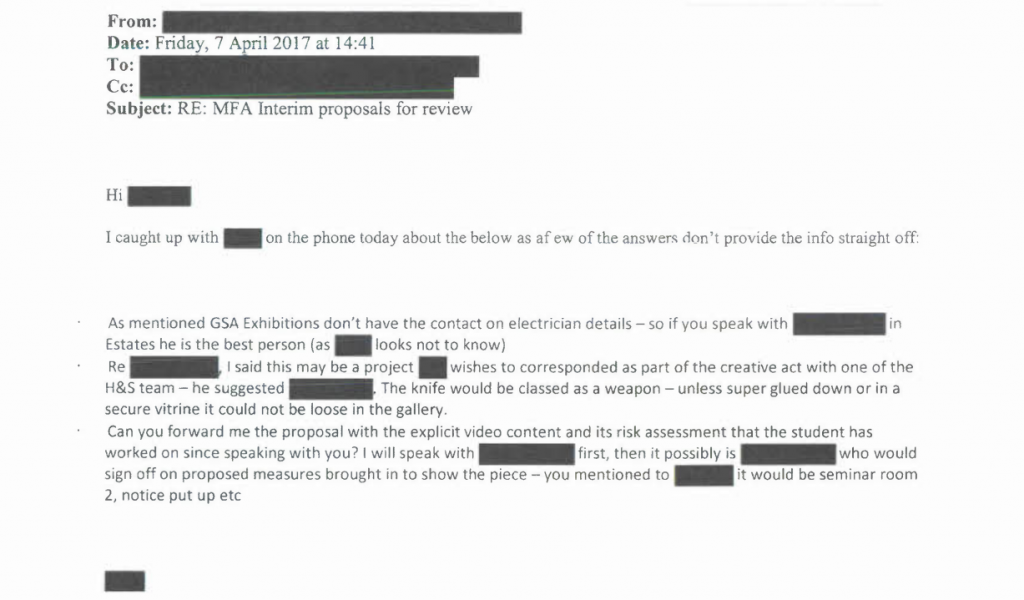
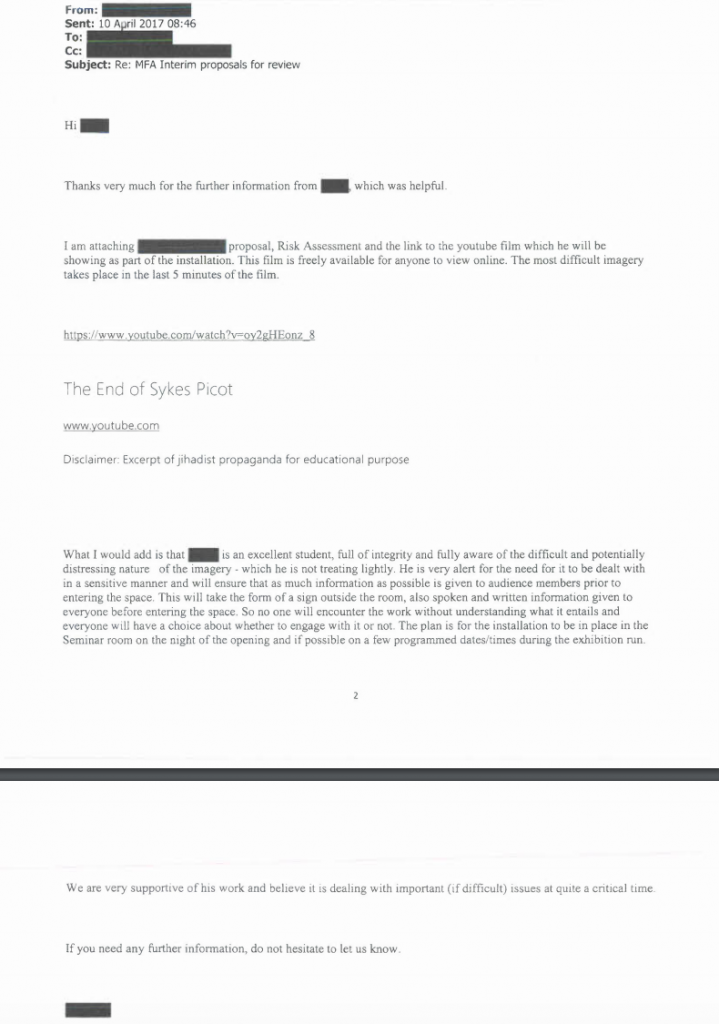
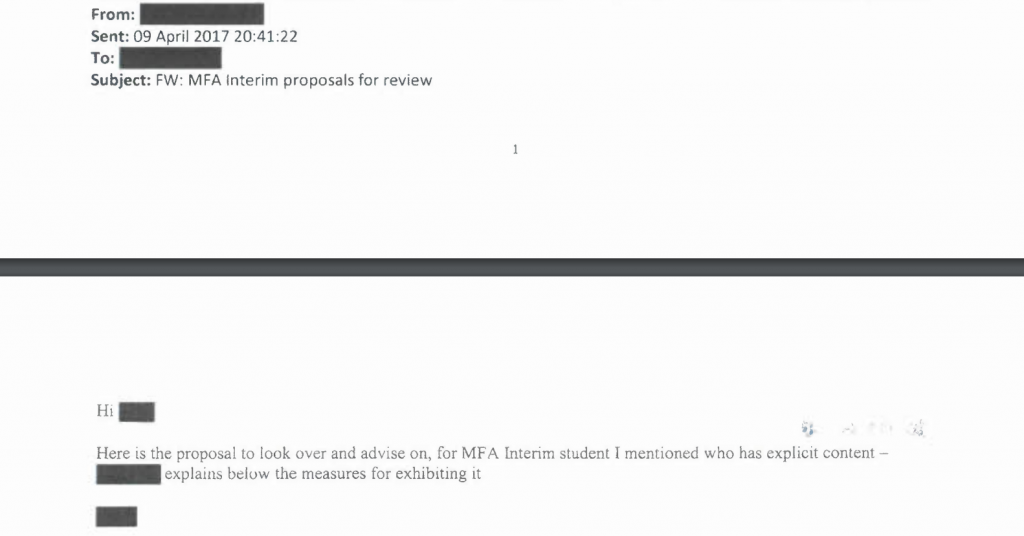
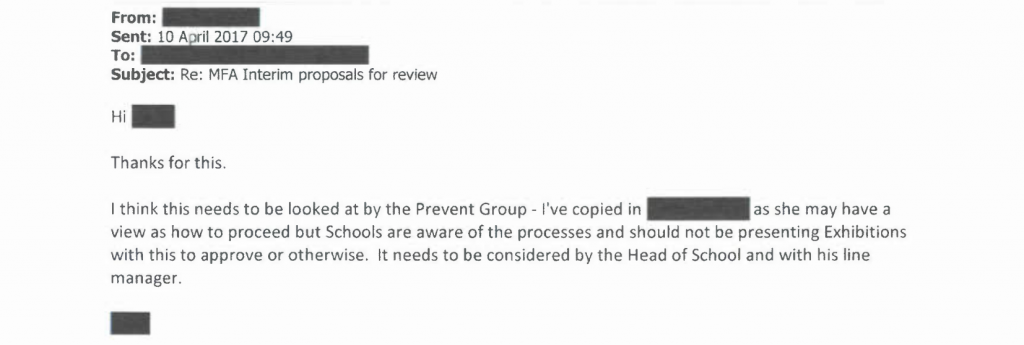

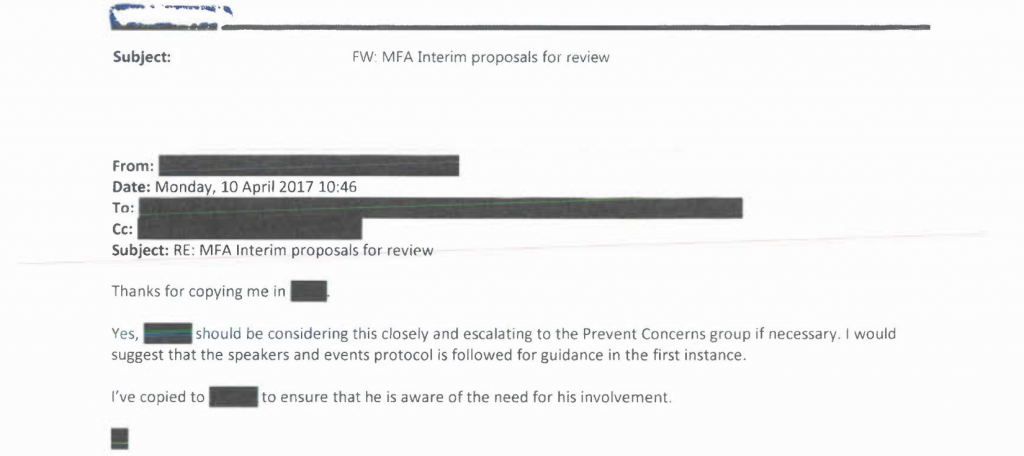 [/vc_column_text][/vc_column][/vc_row][vc_row][vc_column][vc_basic_grid post_type=”post” max_items=”4″ element_width=”6″ grid_id=”vc_gid:1500726862453-8472a316-b3bf-2″ taxonomies=”10100, 8883″][/vc_column][/vc_row]
[/vc_column_text][/vc_column][/vc_row][vc_row][vc_column][vc_basic_grid post_type=”post” max_items=”4″ element_width=”6″ grid_id=”vc_gid:1500726862453-8472a316-b3bf-2″ taxonomies=”10100, 8883″][/vc_column][/vc_row]







 [/vc_column_text][/vc_column][/vc_row][vc_row][vc_column][vc_basic_grid post_type=”post” max_items=”4″ element_width=”6″ grid_id=”vc_gid:1500726862453-8472a316-b3bf-2″ taxonomies=”10100, 8883″][/vc_column][/vc_row]
[/vc_column_text][/vc_column][/vc_row][vc_row][vc_column][vc_basic_grid post_type=”post” max_items=”4″ element_width=”6″ grid_id=”vc_gid:1500726862453-8472a316-b3bf-2″ taxonomies=”10100, 8883″][/vc_column][/vc_row]